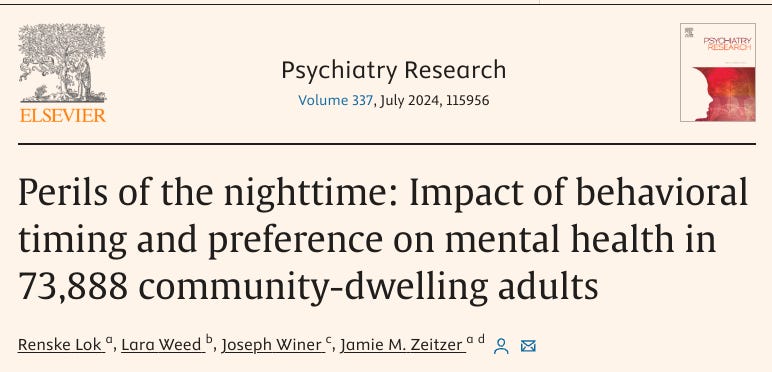When to Go to Sleep for Good Mental Health?
Recent study suggests consistent bedtime before 1am may benefit mental health in evening-types
Prior research has indicated that individuals with a delayed body clock who are late-night sleepers, known as “night owls,” are at higher risk for mental health conditions.
This has been primarily attributed to a discrepancy between their internal circadian rhythm, partly determined by genetics, and societal norms. Having to rise early for work or daily obligations, they can struggle to fall asleep at night and then compensate on weekends by waking up later.
Such discordance with their natural body clock is believed to contribute to chronic stress and mental and physical health issues.
Yet, a recent study conducted by Stanford University researchers challenges this notion.
Among the ~74,000 middle-aged and older adults examined in the UK Biobank for this study, individuals exhibited the following distribution of chronotypes:
9.1% identified as evening-type
25.3% identified as morning-type
65.7% fell into the intermediate category.
Key findings
Morning-types who woke up and went to bed early fared the best mentally.
Evening-types who went to bed earlier than their natural tendency fared better than evening-types who aligned their daily schedule with their body clocks by waking up and going to bed later.
The latter group remained the most susceptible to poor mental health, including anxiety and depression.
Evening-types, with no prior mental illness, who went to bed late were the most likely to develop a mental disorder.
Optimal health outcomes for all chronotypes appear to be associated with individuals who adopt earlier wake and sleep times, possibly sidestepping the pitfalls of the “mind after midnight.”
This theory suggests that staying awake late into the night affects the brain, leading to changes that could predispose you to viewing the world negatively, engaging in harmful behaviors, and making impulsive decisions.
In light of these findings, the researchers advocate for a collective effort to aim for bedtime before 1 am whenever feasible.
Takeaways
→Everyone benefits from going to bed early.
→It might not be prudent to consistently go to bed very late, even if it aligns with your natural inclination and daily obligations.
→People who are evening-types can boost their exposure to natural light throughout the day, along with exposure in the early morning. This strategy can help adjust their body's clock to an earlier schedule allowing to fall asleep earlier at night overtime.





